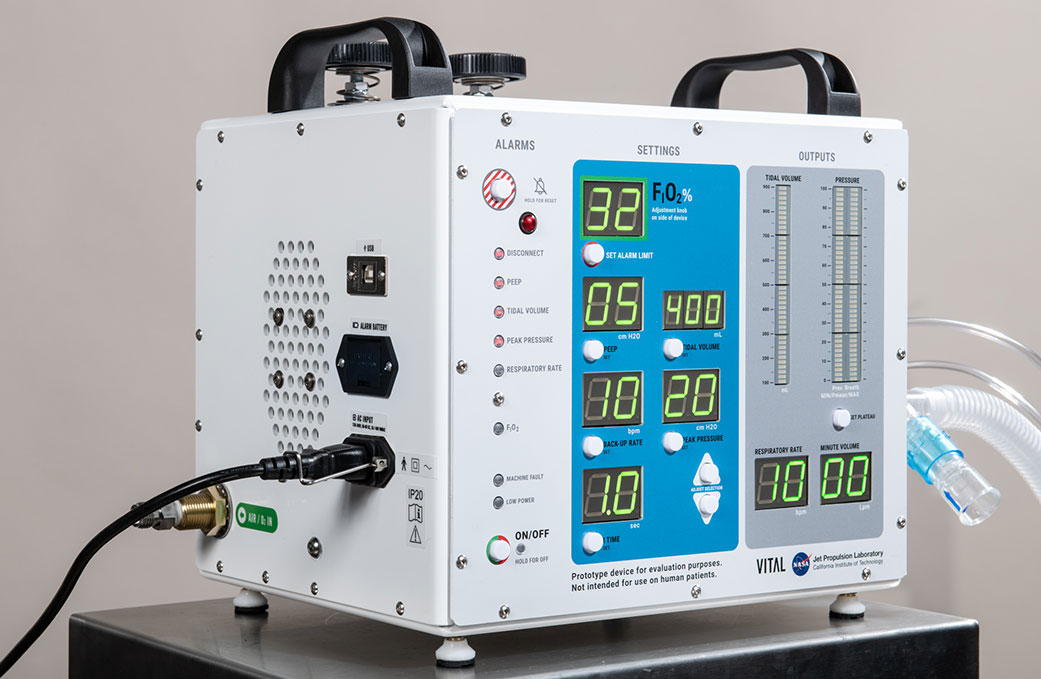FDA approves new NASA ventilator for COVID-19 treatment
NASA engineers invented it in 37 days.

A new ventilator developed by NASA to treat victims of the ongoing coronavirus pandemic has received emergency approval from the U.S. Food and Drug Administration (FDA), the space agency said today (April 30).
The NASA ventilator, a high-pressure device called VITAL, was developed by engineers at the space agency's Jet Propulsion Laboratory in Pasadena, California in response to the limited supply of traditional ventilators for COVID-19 patients suffering from respiratory distress.
"This FDA authorization is a key milestone in a process that exemplifies the best of what government can do in a time of crisis," NASA chief Jim Bridenstine said in a statement. "This ventilator is one of countless examples of how taxpayer investments in space exploration — the skills, expertise and knowledge collected over decades of pushing boundaries and achieving firsts for humanity — translate into advancements that improve life on Earth."
Related: Coronavirus outbreak: live updates
Full coverage: The space industry and the new coronavirus
FDA officials approved the VITAL ventilator (the name is short for Ventilator Intervention Technology Accessible Locally) under the administration's Emergency Use Authorization of March 24. JPL engineers developed the new ventilator in 37 days and tested it April 21 at the Icahn School of Medicine at Mount Sinai in New York.
The ventilator was one of several coronavirus-fighting devices and technologies NASA showed President Donald Trump last week.
"VITAL poses several benefits in the national response to COVID-19," NASA officials said in the statement. "It can be built faster and maintained more easily than a traditional ventilator, and is composed of far fewer parts, many of which are currently available to potential manufacturers through existing supply chains."
Get the Space.com Newsletter
Breaking space news, the latest updates on rocket launches, skywatching events and more!

The device can also be modified for use in field hospitals, like those in some convention centers and hotels across the country, NASA officials added. The VITAL ventilator is designed to last up to four months and is not a replacement for dedicated hospital ventilators, which can last years.
The California Institute of Technology (Caltech), which manages JPL for NASA, is offering a free license for the VITAL ventilator to commercial medical manufacturers.
"Now that we have a design, we're working to pass the baton to the medical community, and ultimately patients, as quickly as possible," Fred Farina, chief innovation and corporate partnerships officer at Caltech, said in the statement. "To that end, we are offering the designs for licensing on a royalty-free basis during the time of the pandemic."
- NASA's Jet Propulsion Laboratory (JPL): Facts & information
- Are ventilators being overused on COVID-19 patients?
- Could genetics explain why some COVID-19 patients fare worse than others?
Email Tariq Malik at tmalik@space.com or follow him @tariqjmalik. Follow us @Spacedotcom, Facebook and Instagram.
OFFER: Save 45% on 'All About Space' 'How it Works' and 'All About History'!
For a limited time, you can take out a digital subscription to any of our best-selling science magazines for just $2.38 per month, or 45% off the standard price for the first three months.
Join our Space Forums to keep talking space on the latest missions, night sky and more! And if you have a news tip, correction or comment, let us know at: community@space.com.

Tariq is the Editor-in-Chief of Space.com and joined the team in 2001, first as an intern and staff writer, and later as an editor. He covers human spaceflight, exploration and space science, as well as skywatching and entertainment. He became Space.com's Managing Editor in 2009 and Editor-in-Chief in 2019. Before joining Space.com, Tariq was a staff reporter for The Los Angeles Times covering education and city beats in La Habra, Fullerton and Huntington Beach. In October 2022, Tariq received the Harry Kolcum Award for excellence in space reporting from the National Space Club Florida Committee. He is also an Eagle Scout (yes, he has the Space Exploration merit badge) and went to Space Camp four times as a kid and a fifth time as an adult. He has journalism degrees from the University of Southern California and New York University. You can find Tariq at Space.com and as the co-host to the This Week In Space podcast with space historian Rod Pyle on the TWiT network. To see his latest project, you can follow Tariq on Twitter @tariqjmalik.










